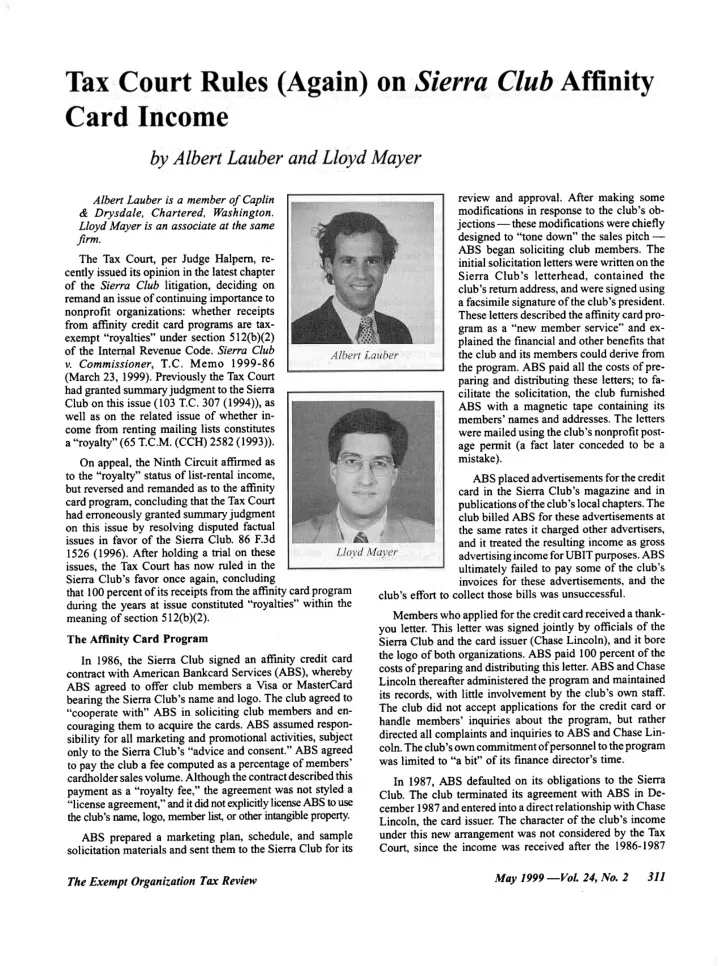

review and approval. After making some Albert Lauber is a member of Caplin modifications in response to the club's ob- & Drysdale, Chartered, Washington. jections -these modifications were chiefly Lloyd Mayer is an associate at the same designed to "tone down" the sales pitch - firm. ABS began soliciting club members. The The Tax Court, per Judge Halpem, re- initial solicitation letters were written on the cently issued its opinion in the latest chapter Sierra Club's letterhead, contained the of the Sierra Club litigation, deciding on club's return address, and were signed using remand an issue of continuing importance to a facsimile signature of the club's president. nonprofit organizations: whether receipts These letters described the affinity card pro- from affinity credit card programs are tax- gram as a "new member service" and ex- exempt "royalties" under section 512(b)(2) plained the financial and other benefits that of the Inter1:tal Revenue Code. Sierra Club the club and its members could derive from v. Commissioner, T.C. Memo 1999-86 the program. ABS paid all the costs of pre- (March 23, 1999). Previously the Tax Court paring and distributing these letters; to fa- had granted summary judgment to the Sierra cilitate the solicitation, the club furnished Club on this issue (103 T.C. 307 (1994», as ABS with a magnetic tape containing its well as on the related issue of whether in- members' names and addresses. The letters come from renting mailing lists constitutes were mailed using the club's nonprofit post- a "royalty" (65 T.C.M. (CCH) 2582 (1993». age permit (a fact later conceded to be a mistake). On appeal, the Ninth Circuit affirmed as to the "royalty" status of list-rental income, ABS placed advertisements for the credit but reversed and remanded as to the affinity card in the Sierra Club's magazine and in card program, concluding that the Tax Court publications of the club's local chapters. The had erroneously granted summary judgment club billed ABS for these advertisements at on this issue by resolving disputed factual the same rates it charged other advertisers, issues in favor of the Sierra Club. 86 F.3d and it treated the resulting income as gross 1526 ( 1996). After holding a trial on these advertising income for UBIT purposes. ABS issues, the Tax Court has now ruled in the ultimately failed to pay some of the club's Sierra Club's favor once again, concluding invoices for these advertisements, and the that 100 percent of its receipts from the affinity card program club's effort to collect those bills was unsuccessful. during the years at issue constituted "royalties" within the Members who applied for the credit card received a thank- meaning of section 512(b)(2). you letter. This letter was signed jointly by officials of the The Affinity Card Program Sierra Club and the card issuer (Chase Lincoln), and it bore the logo of both organizations. ABS paid 100 percent of the In 1986, the Sierra Club signed an affmity credit card costs of preparing and distributing this letter. ABS and Chase contract with American Bankcard Services (ABS), whereby Lincoln thereafter administered the program and maintained ABS agreed to offer club members a Visa or MasterCard its records, with little involvement by the club's own staff. bearing the Sierra Club's name and logo. The club agreed to The club did not accept applications for the credit card or "cooperate with" ABS in soliciting club members and en- handle members' inquiries about the program, but rather couraging them to acquire the cards. ABS assumed respon- directed all complaints and inquiries to ABS and Chase Lin- sibility for all marketing and promotional activities, subject coln. The club's own commitment of personnel to the program only to the Sierra Club's "advice and consent." ABS agreed to pay the club a fee computed as a percentage of members , was limited to "a bit" of its finance director's time. cardholder sales volume. Although the contract described this In 1987, ABS defaulted on its obligations to the Sierra payment as a "royalty fee," the agreement was not styled a Club. The club terminated its agreement with ABS in De- "license agreement," and it did not explicitly license ABS to use cember 1987 and entered into a direct relationship with Chase the club's name, logo, member list, or other intangible property. Lincoln, the card issuer. The character of the club's income under this new arrangement was not considered by the Tax ABS prepared a marketing plan, schedule, and sample Court, since the income was received after the 1986-1987 ~ solicitation materials and sent them to the Sierra Club for its 311 May 1999 -Vol. 24, No.2 The Exempt Organization Tax Review
Recommend
More recommend